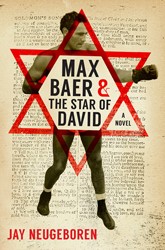Prize-winning author Jay Neugeboren has crafted a fascinating novel that reimagines the life of Max Baer, a champion boxer of the 1930s. Baer rose to fame at the height of the Great Depression and is best known for defeating German boxer Max Schmeling in 1933 while wearing a Star of David on his shorts in honor of his Jewish grandfather. In the novel, Neugeboren stays true to Baer’s excitable and flashy but gentle personality, which he describes from the perspective of Horace Littlejohn, the fictional narrator. Horace and his sister, Joleen, are enigmatic characters who present themselves publicly as husband and wife; both have peculiar sexual relationships with Baer, which are developed over the course of the novel.
Neugeboren’s language skillfully describes the sharp contrasts within the personalities of his major characters. For instance, Baer is remarkably open and public about matters ranging from his sexual affairs to his finances, all of which Horace colorfully details. However, he is quite secretive regarding his relationships with the Littlejohns, which Horace likewise only mentions obliquely and in snippets. Readers will also notice that some scenes are far more believable than others: Baer’s emotional state after leaving one opponent dead and another fatally injured (both incidents that actually occurred) is described poignantly and realistically, but the irregular relationships between the three primary characters are less believable, given the combination of adultery, bisexuality, and incest.
Neugeboren’s Max Baer experiences his Jewishness primarily through a sense of community. When Baer sets out to defeat Schmeling, he discusses his desire to prove that the Jewish people can take care of themselves, and emphasizes the importance of Schmeling’s defeat as a blow to the Nazi image. Of course, Baer’s view of himself as a defender of the Jewish people is interwoven with his more personal desire for the press and attention that the Star of David attracts. In this way, Neugeboren attempts to unravel the historical question of Baer and his Jewishness. While some historians believe that Baer’s Jewish star was more a marketing ploy than a demonstration of a sincere attachment to his heritage, Neugeboren portrays Baer as at least partially identifying with Jewishness. Regardless, Baer certainly was very popular among Jews in his heyday, as he was strong and capable — the opposite of the Jewish stereotype during that period of vulnerability.
Neugeboren’s latest novel will captivate readers through its language and the characters’ complicated relationships. Some readers might feel frustrated by the obliqueness of the writing or perturbed by the issues of incest and adultery. Others will be fascinated by Neugeboren’s portrayal of Max Baer as a fallible but larger-than-life individual.


